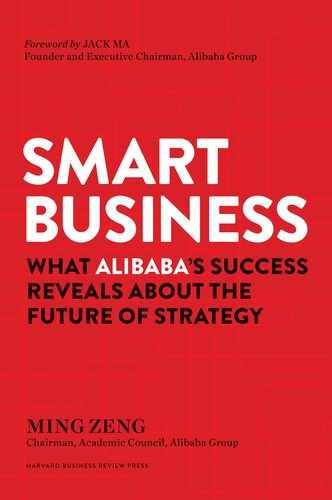FURTHER READING
Alibaba
Clark, Duncan. Alibaba: The House That Jack Ma Built. New York: Ecco, 2016.
The authoritative outsider account of Alibaba.
Erisman, Porter. Alibaba’s World: How a Remarkable Chinese Company Is Changing the Face of Global Business. New York: St. Martin’s Press, 2015.
The story of the founding of Alibaba and Taobao as told by one of the company’s earliest foreign vice presidents.
Tse, Edward. China’s Disruptors: How Alibaba, Xiaomi, Tencent, and Other Companies Are Changing the Rules of Business. New York: Portfolio, 2015.
One of the rare books on Chinese business that gets it right. Ed Tse was formerly the head of first the Boston Consulting Group and then Booz Allen Hamilton’s practices in China.
Network Coordination
Barabasi, Albert-Laszlo. Linked: The New Science of Networks. New York: Basic Books, 2014.
An accessible and comprehensive introduction to the theories of network science by one of the giants in the field of complex networks.
Easley, David, and Jon Kleinberg. Networks, Crowds, and Markets: Reasoning about a Highly Connected World. Cambridge: Cambridge University Press, 2010.
An undergraduate textbook that condenses the complicated concepts and theories behind network coordination into digestible, intuitive ideas and applies them to real-world situations.
Shirky, Clay. Here Comes Everybody: The Power of Organizing without Organizations. New York: Penguin Books, 2008.
Classic thinking on how to organize behavior and work without hierarchies or central management.
Data Intelligence
Domingos, Pedro. The Master Algorithm: How the Quest for the Ultimate Learning Machine Will Remake Our World. New York: Basic Books, 2015.
One of the best broad introductions to machine learning and algorithms for a nontechnical audience.
MacCormick, John. 9 Algorithms That Changed the Future. Princeton, NJ: Princeton University Press, 2011.
An in-depth but accessible look at how the most important algorithms in computer science are used to utilize data intelligence across society.
Mayer-Schönberger, Victor, and Kenneth Cukier. Big Data: A Revolution That Will Transform How We Live, Work, and Think. Boston: Houghton Mifflin Harcourt, 2013.
The classic book that popularized the term big data is still worth reading for its observations about the changes to business and society brought on by new technologies for collecting and processing data at a massive scale.
O’Neil, Cathy. Weapons of Math Destruction: How Big Data Increases Inequality and Threatens Democracy. New York: Broadway Books, 2016.
Alarmist tone aside, this book presents the flip side of Mayer-Schönberger’s predictions about big data, explaining how a badly designed feedback loop can go wrong and how to design these loops effectively.
Platform Strategy
Evans, David S., and Richard Schmalensee. Matchmakers: The New Economics of Multisided Platforms. Boston: Harvard Business Review Press, 2016.
A comprehensive look at the economic principles behind multisided markets (what I call plane firms in chapter 6) and the challenges of getting them started.
Kelly, Kevin. Out of Control. New York: Basic Books, 2009.
Despite its prolix style, still one of the best in-depth looks at the strategic mindset needed to shepherd (rather than plan) the growth of a business ecosystem.
Mitchell, Melanie. Complexity: A Guided Tour. Oxford: Oxford University Press, 2009.
A clear and accessible introduction to the science of complex systems.
Parker, Geoffrey G., Marshall W. Van Alstyne, and Sangeet Paul Choudary. Platform Revolution: How Networked Markets Are Transforming the Economy and How to Make Them Work for You. New York: W. W. Norton & Company, 2016.
A deeply practical and grounded breakdown of platform business models, their core components, and how to jump-start specific tactics and strategies.
Information Economics and Its Business Applications
Anderson, Chris. The Long Tail: Why the Future of Business Is Selling Less of More. New York: Hachette Books, 2006.
One of the earliest and most lucid books on how internet technology affects business models, strategy, and operations.
Chandler, Alfred D., and James W. Cortada. A Nation Transformed by Information: How Information Has Shaped the United States from Colonial Times to the Present. Oxford: Oxford University Press, 2003.
Though this book is less well-known than Chandler’s Scale and Scope, business historian par excellence Chandler is equally at his best in this recounting of how information technology changes business and society.
Shapiro, Carl, and Hal R. Varian. Information Rules: A Strategic Guide to the Network Economy. Boston: Harvard Business School Review Press, 1998.
Every smart business traffics in information goods to some degree; even after two decades, this classic of information economics is still required reading for those who wish to understand the counterintuitive principles of information’s value creation and transfer.
Addressing the Future
Drucker, Peter. Management Challenges for the 21st Century. London: Routledge, 2015.
One of Drucker’s last and best books on the comprehensive changes to management and organizations caused by technological change.
Kelly, Kevin. The Inevitable: Understanding the 12 Technological Forces That Will Shape Our Future. New York: Penguin Books, 2016.
This book presents some of the future’s most important technological trends abstracted so that they apply to all readers.
Tegmark, Max. Life 3.0: Being Human in the Age of Artificial Intelligence. New York: Knopf, 2017.
A guide to working and living with, not just despite, AI.
